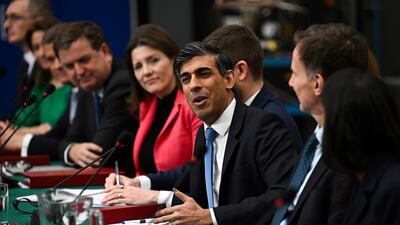There were always certain phrases associated with the British Conservative party when I was growing up. One was that they claimed (with some justification) to be the natural party of government. Between 1886 and 1997 they were in government for 77 out of 111 years, and between 1951 and 1997 they occupied power for 35 out of 46 years.
They said that their secret weapon was loyalty. Some claimed that they were less interested in ideology and more in what actually works in practical terms. And that they strongly believed in the idea of personal responsibility, in the union of the UK and being practical people dedicated to solving problems.
After yet another torrid week in British politics, none of these assertions seems to hold - if they ever did.
It is true that the Conservative party has been the UK's most formidable election-winning machine. It is also true that one reason for that has been its ability to adapt to changing times. But the past week has been a horror show, undermining still further the leadership – if that is the right word – of Prime Minister Rishi Sunak, and revealing a streak of national populism, Islamophobia, and failure to recognise one simple fact. After 14 years in government, it is very difficult for the party to escape responsibility for the serious problems in British public life.
In the most glaring case of self-harm within the Conservative party and the country, former deputy chair Lee Anderson said of London Mayor (and Labour party member) Sadiq Khan: "I don't actually believe that the Islamists have got control of our country, but what I do believe is they've got control of Khan and they've got control of London ... He's actually given our capital city away to his mates." Mr Khan responded: "These comments pour fuel on the fire of anti-Muslim hatred."
Numerous commentators and politicians of all parties and different religious and cultural backgrounds agreed with Mr Khan and condemned Mr Anderson's comments as Islamophobic. But there's more. Much more.
Former home secretary Suella Braverman, who like Mr Anderson remains an MP, called pro-Palestinian protesters "hate marchers" who are not interested in Gaza, asserting "the primacy by certain groups - particularly Islamists". She even suggested that Islamists are in some way in charge in Britain.
Again, the comments were widely condemned. Zara Mohammed, the Muslim Council of Britain secretary general, called for an investigation and said: "Our view is that the Islamophobia in the [Conservative] party is institutional, tolerated by the leadership and seen as acceptable by great swathes of the party membership."
There's still more.
Former prime minister Liz Truss, speaking at the US Conservative Political Action Conference, suggested that her seven weeks in power were scuppered not by her own incompetence and spooking the financial markets with a failed budget programme but by the "deep state", including the Financial Times and The Economist.
She said: "These are the friends of the bureaucratic establishment and they are the friends of the deep state and they work together with the bureaucrats, of which we've got many more in Britain than you have here in the US, to keep things the same."
No personal responsibility. No contrition. No shame. And what has become extraordinary after 14 years of being in government is the way in which former ministers now seem to act not like former ministers, accepting responsibility for what they have done. Instead, they often act as if they were in opposition for the past 14 years. They are running as far away as possible from the mess they have created and blaming – in the case of Ms Truss with increasing fatuity – everyone else except themselves.
The serious point is that the UK appears rudderless. Mr Sunak is deeply unpopular, even within his own party. A leader like Margaret Thatcher inspired loyalty but also fear. Mr Sunak inspires neither. Even Boris Johnson established his authority by getting rid of Conservative MPs who did not support his Brexit plans.
Perhaps – as usual – there is a lesson from history.
Oliver Cromwell, the leader who led a coup against the British monarchy in the 17th century, turned on Parliament with words that have gone down in history.
Cromwell told Parliament, in 1653: "It is not fit that you should sit here any longer. You have sat here too long for any good you have been doing lately ... In the name of God, go."
On May 7, 1940, in the darkest days of the Second World War, a Conservative MP named Leopold Amery used similar language to urge the departure of Neville Chamberlain as prime minister and help Winston Churchill lead the war effort.
Amery said: "Depart, I say, and let us have done with you. In the name of God, go."
Someone within the Conservative party needs to find the courage to say something similar right now to Mr Sunak. If he stays, things will get worse for him – and worse for the country.


